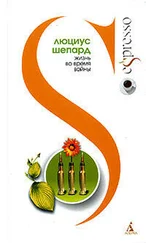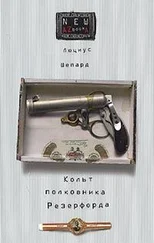Darkness closed in, the crowds thickened again, and Mingolla continued his walk, strolling past stalls with necklaces of light bulbs strung along their frames, wires leading off them to generators whose rattle drowned out the chirring of frogs and crickets. Stalls selling plastic rosaries, Chinese switchblades, tin lanterns; others selling embroidered Indian shirts, flour-sack trousers, wooden masks; others yet where old men in shabby suit coats sat crosslegged behind pyramids of tomatoes and melons and green peppers, each with a candle cemented in melted wax atop them, like primitive altars. Laughter, shrieks, vendors shouting. Mingolla breathed in perfume, charcoal smoke, the scents of rotting fruit. He began to idle from stall to stall, buying a few souvenirs for friends back in New York, feeling part of the hustle, the noise, the shining black air, and eventually he came to a stall around which forty or fifty people had gathered, blocking all but its thatched roof from view. A woman’s amplified voice cried out, “LA MARIPOSA!” Excited squeals from the crowd. Again the woman cried out, “EL CUCHILLO!” The two words she had called—the butterfly and the knife—intrigued Mingolla, and he peered over heads.
Framed by the thatch and rickety poles, a dusky-skinned young woman was turning a handle that spun a wire cage: it was filled with white plastic cubes, bolted to a plank counter. Her black hair was pulled back from her face, tied behind her neck, and she wore a red sundress that left her shoulders bare. She stopped cranking, reached into the cage and without looking plucked one of the cubes; she examined it, picked up a microphone and cried, “LA LUNA!” A bearded guy pushed forward and handed her a card. She checked the card, comparing it to some cubes that were lined up on the counter; then she gave the bearded guy a few bills in Guatemalan currency.
The composition of the game appealed to Mingolla. The dark woman; her red dress and cryptic words; the runelike shadow of the wire cage; all this seemed magical, an image out of an occult dream. Part of the crowd moved off, accompanying the winner, and Mingolla let himself be forced closer by new arrivals pressing in from behind. He secured a position at the corner of the stall, fought to maintain it against the eddying of the crowd, and on glancing up, he saw the woman smiling at him from a couple of feet away, holding out a card and a pencil stub. “Only ten cents Guatemalan,” she said in American-sounding English.
The people flanking Mingolla urged him to play, grinning and clapping him on the back. But he didn’t need urging. He knew he was going to win: it was the clearest premonition he had ever had, and it was signaled mostly by the woman herself. He felt a powerful attraction to her. It was as if she were a source of heat… not of heat alone but also of vitality, sensuality, and now that he was within range, that heat was washing over him, making him aware of a sexual tension developing between them, bringing with it the knowledge that he would win. The strength of the attraction surprised him, because his first impression had been that she was exotic-looking but not beautiful. Though slim, she was a little wide-hipped, and her breasts, mounded high and served up in separate scoops by her tight bodice, were quite small. Her face, like her coloring, had an East Indian cast, its features too large and voluptuous to suit the delicate bone structure; yet they were so expressive, so finely cut, that their disproportion came to seem a virtue. Except that it was thinner, it might have been the face of one of those handmaidens you see on Hindu religious posters, kneeling beneath Krishna’s throne. Very sexy, very serene. That serenity, Mingolla decided, wasn’t just a veneer. It ran deep. But at the moment he was more interested in her breasts. They looked nice pushed up like that, gleaming with a sheen of sweat. Two helpings of shaky pudding.
The woman waggled the card, and he took it: a simplified Bingo card with symbols instead of letters and numbers. “Good luck,” she said, and laughed, as if in reaction to some private irony. Then she began to spin the cage.
Mingolla didn’t recognize many of the words she called, but an old man cozied up to him and pointed to the appropriate square whenever he got a match. Soon several rows were almost complete. “LA MANZANA!” cried the woman, and the old man tugged at Mingolla’s sleeve, shouting, “Se gano!”
As the woman checked his card, Mingolla thought about the mystery she presented. Her calmness, her unaccented English and the upper class background it implied, made her seem out of place here. Maybe she was a student, her education interrupted by the war… though she might be a bit too old for that. He figured her to be twenty-two or twenty-three. Graduate school, maybe. But there was an air of worldliness about her that didn’t support that theory. He watched her eyes dart back and forth between the card and the plastic cubes. Large, heavy-lidded eyes. The whites stood in such sharp contrast to her dusky skin that they looked fake: milky stones with black centers.
“You see?” she said, handing him his winnings—about three dollars—and another card.
“See what?” Mingolla asked, perplexed.
But she had already begun to spin the cage again.
He won three of the next seven cards. People congratulated him, shaking their heads in amazement; the old man cozied up further, suggesting in sign language that he was the agency responsible for Mingolla’s good fortune. Mingolla, however, was nervous. His ritual was founded on a principle of small miracles, and though he was certain the woman was cheating on his behalf (that, he assumed, had been the meaning of her laughter, her “You see?”), though his luck was not really luck, its excessiveness menaced that principle. He lost three cards in a row, but thereafter won two of four and grew even more nervous. He considered leaving. But what if it were luck? Leaving might run him afoul of a higher principle, interfere with some cosmic process and draw down misfortune. It was a ridiculous idea, but he couldn’t bring himself to risk the faint chance that it might be true.
He continued to win. The people who had congratulated him became disgruntled and drifted off, and when there were only a handful of players left, the woman closed down the game. A grimy street kid materialized from the shadows and began dismantling the equipment. Unbolting the wire cage, unplugging the microphone, boxing up the plastic cubes, stuffing it all into a burlap sack. The woman moved out from behind the stall and leaned against one of the roofpoles. Half-smiling, she cocked her head, appraising Mingolla, and then—just as the silence between them began to get prickly—she said, “My name’s Debora.”
“David.” Mingolla felt as awkward as a fourteen-year-old; he had to resist the urge to jam his hands into his pockets and look away.
“Why’d you cheat?” he asked; in trying to cover his nervousness, he said it too loudly and it sounded like an accusation.
“I wanted to get your attention,” she said. “I’m… interested in you. Didn’t you notice?”
“I didn’t want to take it for granted.”
She laughed. “I approve! It’s always best to be cautious.”
He liked her laughter; it had an easiness that made him think she would celebrate the least good thing.
Three men passed by arm-in-arm, singing drunkenly. One yelled at Debora, and she responded with an angry burst of Spanish. Mingolla could guess what had been said, that she had been insulted for associating with an American. “Maybe we should go somewhere,” he said. “Get off the streets.”
“After he’s finished.” She gestured at the kid, who was now taking down the string of light bulbs. “It’s funny,” she said. “I have the gift myself, and I’m usually uncomfortable around anyone else who has it. But not with you.”
Читать дальше






